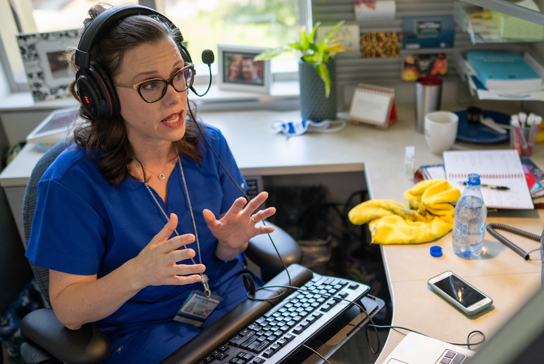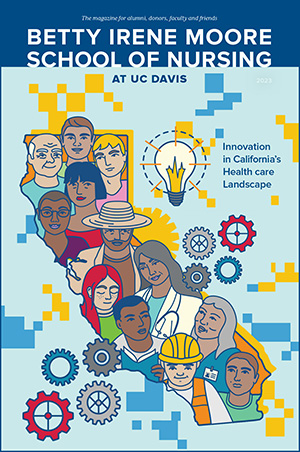Decreasing HIV risk for sexual assault survivors
Researcher developing multimedia app to educate about post-exposure HIV medications

A School of Nursing professor was awarded a grant to develop an app to support providers and patients in the decision-making process for preventive medications following sexual assault.

Assistant Professor Jessica Draughon Moret was recently awarded a National Institute of Mental Health grant to develop a patient-provider decision aid for medication following sexual assault.
Every two minutes a person in America is sexually assaulted.
Individuals who have experienced sexual assault cope with trauma, stigma and face many considerations regarding their health. That includes possible exposure to HIV and other sexually transmitted infections.
Since HIV is a virus that affects the immune system, one way to prevent contracting it after a sexual encounter is postexposure prophylaxis, or PEP. HIV experts recommend taking the combination of antiretroviral medications — as directed — within 72 hours of exposure. But that’s easier said than done.
“As providers, we’re working on CDC guidelines from 2016. From the literature, it seems like across the board, sexual assault patients have the lowest adherence to PEP after exposure. Sexual assault is hamstrung in many ways because of where the guidelines are as compared to HIV treatment advances over the past six years,” said Jessica Draughon Moret, an assistant professor at the Betty Irene Moore School of Nursing at UC Davis.
Draughon Moret is a forensic nurse whose research focuses on structural factors contributing to women’s health disparities. Now, as co-investigator on a Planning Grant Program R34 $750,000 grant from the National Institute of Mental Health, she can continue the work she began in her dissertation, “Development of a Patient-Provider Decision Aid for HIV Post-Exposure Prophylaxis (PEP).”
“During my doctoral program, I focused on what was going on at the patient level. My review of chart data at the time indicated that we don’t really know why patients don’t take PEP,” Draughon Moret explained. “What providers thought and what patients did were at odds.”
Her research showed that health care providers determine whether a patient is offered the medication in the first place. In addition, the way the risk of HIV was presented to and discussed with the patient could potentially influence who opts to take the medication. By using a multimedia app to present the information, she hopes to minimize the differences in how providers talk about PEP with patients as one step in giving patients back control over their health.
Making decisions in the digital age
In this new three-year project, she examines the decision-making process in hopes creating a scalable intervention through technology to improve adherence.
“A lot of decision aids are paper based. We know HIV prevention moves very quickly. We hope that HIV prevention in the context of sexual assault will move quickly. We want a nimble platform to keep us up to date for users to make informed decisions,” Draughon Moret said.
The grant provides time and funds to create a tool, an app, to support patients and providers in the decision-making process. Draughon Moret envisions that a patient comes in, the provider enters their information and individualized risk factors into the decision aid. The decision-aid tool then guides the provider — based on the patient-specific data they entered — when and if to offer PEP, including guidance on how to have the conversation post sexual assault.
Destine Teves Borrego is a sexual assault nurse examiner and an HIV PEP coordinator in Los Angeles. She believes Draughon Moret’s app could provide strong reinforcement and a simple way for patients to make tough decisions in a short amount of time.
“Our job as examiners is to give them all the information they need in a way that’s understandable. We want them to regain control and make a decision for themselves,” Torres Borrego explained. “Sometimes, patients are hesitant and unwilling to ask questions when navigating such a complicated event. An app can enhance what a sexual assault forensic examiner has already discussed with the patient and could offer a comfortable way for them to go through question and concerns.”
Patients can also enter in their personal priorities and get personalized feedback, including guidance around cost, medication side effects and how to manage them, and leveraging social supports they have in place. The goal of the decision aid is to decrease decisional conflict.
“Our suspicion is that if you’re more confident in your decision, you’re more likely to take it [HIV PEP] all 28 days,” Draughon Moret said. “Policy things are at play here, too. We’re working to improve access from ground up as well as keeping an eye on what is happening at the national policy level.”
Further complicating the dynamics of prescribing and medication adherence is inconsistency in who pays for the expensive medication and if the patient has the social support to stick to the 28-day regimen. The Violence Against Women Act stipulates that the funds for a post-assault exam cannot be paid for by the victim. However, jurisdictions determine what falls within the scope of the exam, including medication.
Help in order to heal
Draughon Moret dedicates her life’s work to this population she believes is forgotten.
“This population has a lot of unwarranted shame based on societal stigma. The truth is no one chooses to be sexually assaulted. It is someone who chooses to violate another human being,” she explained. “I have the skills, knowledge and capability to make that immediate aftermath just a little bit better or at least not make it worse.”
Draughon Moret hopes this ultimately prevents disease and promotes healing for survivors.
So does the principal investigator on the project, Jocelyn Anderson, a forensic nurse and assistant professor at the Penn State Ross and Carol Nese College of Nursing.
“We want to make sure survivors have the information they need about PEP to make the right choice for them even and especially in the context of trauma,” Draughon Moret said. “That choice can help them heal.”





